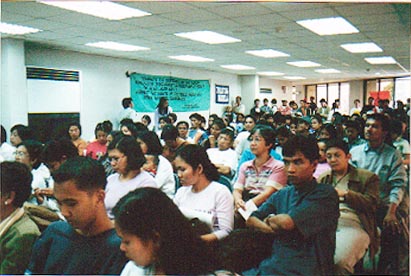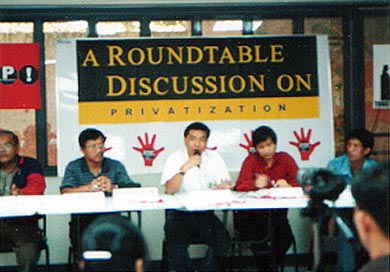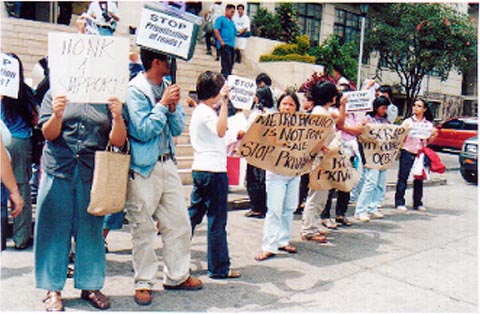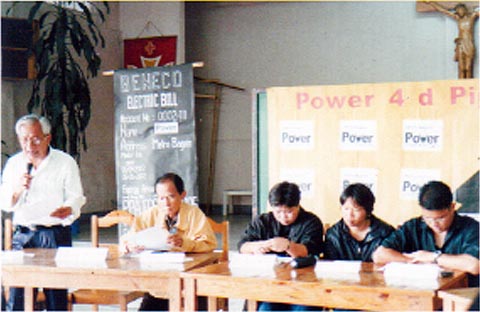
The Cordillera Peoples Alliance website
Posted: July 11, 2004
 |
Metro
Baguio situationer The Cordillera Peoples Alliance website Posted: July 11, 2004 |
| |
METRO
BAGUIO SITUATIONER (AS OF MARCH 2004) |
||||||||||||||||||||||||||||||||||||||||||||||||||||||||||||||||||||||||||||||||||||||||||||||||||||||||||||||||||||||||||||||||||||||||
|
|
 |
In light of the dreaded multisectoral impacts of privatization, Tongtongan Ti Umili-Cordillera Peoples Alliance together with supportive groups and allies successfully launched the Solidarity to Oppose Privatization!, Metro-Baguio (STOP!-MB) on September 1, 2001. |
 |
Privatization of health services
The two major public hospitals in Metro Baguio are now being subjected to privatization. The different departments of Baguio General Hospital are being privatized piecemeal. Its dialysis center is said to be controlled by a US firm. BGH has also two newly constructed buildings for pay wards.
Following the trend to privatize the health sector, the Benguet Provincial Board has declared Benguet General Hospital (BeGH) as an “economic enterprise” in early 2004 through Ordinance No. 4-88. A Board of Directors has been formed with broad decision-making powers, including the power to ratify earlier agreements with the provincial board, such as the 60-40 percent ratio of the hospital’s 200-bed capacity for charity and pay wards respectively.
As an “economic enterprise”, BeGH would still receive an annual subsidy of P40 million from the provincial government, but this subsidy may cease once the hospital becomes financially viable through the collection of additional fees from indigent patients.
In May 2004, affected BeGH employees passed a counter-proposal, pressuring the Provincial Board to recall the ordinance. The employees’ protest raised 16 concerns, ranging from continuous appropriation to the composition of an oversight committee to ensure the smooth implementation of the ordinance.
Before this latest attempt to corporatize, BeGH already turned over its dialysis and physical therapy department to private firms.
Continuing the privatization trend, the Baguio Health Department also increased its fees on services and laboratory fees.
Privatization of the educational system
The government’s meager budget for state universities and public schools means a yearly slice of subsidies, pushing these public institutions to further privatize. As a result, student youth from all over Northern Luzon and even some Central Luzon provinces who go to study in Metro Baguio have to endure unending increases in tuition and other fees, and the general worsening of the educational system.
For several months now, students of the University of the Philippines (UP) System including UP Baguio students have voiced their strong opposition to Senate Bill 2587 (formerly House Bill 455), which is designed to privatize the UP system, leading to higher tuition fees. Section 10 of SB 2587 states that the Board of Regents, the highest policy-making body of the University, will be vested with corporate powers, indicating the openness to engage in business and other profit-making schemes to generate funds for the university’s operations.
The small budget for public education affects all public elementary and high schools in the city. In Baguio City National High School (BCNHS) alone, as per 2003 data, there were only 365 teachers serving a large student population of nearly 12,000. At the Pines City National High School (PCNHS), 7,000 students on the first day of classes had to be serviced by only 174 teachers. In both schools, the average class size ranges from 70 to 80 students per class. There are worse cases of high student-teacher ratios in the city, with the highest recorded figure so far reaching 92 students per teacher at the BCNHS Fort Del Pilar Annex during school year 2002-2003.
Privatization of market, comfort rooms and roads
The Baguio City local government’s blind drive to privatize its market, roads, even public toilets, underscored the intense mayhem inflicted by favored corporate interests against the general public welfare.
The pay parking scheme on city roads, which is privately operated by and mainly benefits Jadewell Systems, is proving itself a fiasco with its continuous violations of Land Transportation Office’s supposed mandate, police traffic management, and city council ordinances, aggravated by its arrogant posturing. Designating sections of city roads as pay parking areas worsened traffic congestion. The Jadewell scheme has displaced public utility jeep and taxi drivers, local motorists and commuters. In addition, Jadewell has failed to remit to the City Treasurer’s Office the full revenue share of the city from its pay-parking operations.
 |
|
| Holding of picket/protest in front of Baguio City Hall to influence city officials for the rescission of the Memorandum of Agreement (MOA) between Baguio City and the Jadewell Parking System’s Corporation which paved for the privatization of major streets in Baguio City. |
Privatization of public utilities
The imposition of the onerous PPA scheme (Power Purchased Adjustment, now being concealed through the so-called “unbundled rates”) on consumers and the privatization of National Power Corporation (NPC) have resulted in unjust power rates that go far beyond the consumers’ actual use of electricity. In Benguet province, the Benguet Electric Cooperative (BENECO) is still bound to collect the PPA. These high rates are expected to increase again with the conversion of BENECO from a non-stock, non-profit cooperative to a stock cooperative.
 |
| A forum against the Power Purchased Agreement (PPA), an agreement between the National Power Corporation and Independent Power Producers which had led to the uncontrollable increases of electric/power rates. |
Furthermore, water rates in Baguio continue to increase, driven by the Baguio Water District’s need to pay its P796.75 million loan incurred for the Baguio Water System’s Rehabilitation and Expansion Project. Attempts to pass on the loan burden to water consumers would escalate again with the P3-billion Bulk Water Supply Project. Aside from this, the Bulk Water Supply Project threatens to privatize public water sources, which could be a prelude to more extensive water privatization and the dependency to water rationing of the entire BLIST area. (Read related article: Water war?)
Privatization’s impact on government employees
Mergers and abolitions of government agencies inevitably lead to the reduction of positions in the civil service. Thus, more than 2,000 government employees in the Cordillera – most of whom are in Metro Baguio – are faced with retrenchment and contractualization.
In Baguio City alone, 87 waste management workers, threatened with displacement, petitioned the city council to reconsider its proposed privatization of garbage collection, hauling and disposal. The reorganization of four City Hall departments (General Services Office, Public Utilities and Services, City Engineering Office, Office of City Architect and Parks’ Superintendent) is threatening 349 more city employees.
Labor sector in the midst of economic bankruptcy
National Statistics Office (NSO) figures admit that the country’s unemployment rose from 3.42 million in 2002 to 3.6 million in 2003. Unemployment rates also increased in the Cordillera provinces. Compared to other provinces, Baguio City has the highest unemployment rate of 17.2% in a total labor force of 199,000. (Refer to table.)
Table 1. EMPLOYMENT AND UNDEREMPLOYMENT
RATES AS OF JANUARY 2004 CAR
Source: National Statistics Office
Province |
Labor force (LF) |
LF participation |
Employment |
Unemployment |
Under-employment |
| Abra | 142,000 | 65.8% | 91.8% | 8.2% | 6.1% |
|
Baguio-Benguet Baguio only Benguet |
429,000 199,000 230,000 |
62.3% 54.6% 69.0% |
86.6% 82.8% 89.0% |
13.4% 17.2% 10.7% |
4.3% 4.4% 4.6% |
| Ifugao | 106,000 | 80.1% | 90.8% | 9.2% | 13.6% |
| Kalinga | 109,000 | 73.5% | 89.5% | 10.5% | 2.1% |
| Mtn. Province | 91,000 | 89.4% | 95.4% | 4.6% | 2.8% |
| Apayao | 61,000 | 75.3% | 96.7% | 3.3% | 21.0% |
| TOTAL | 939,000 |
Unemployment, retrenchment, low wages and poor working conditions haunt urban workers and their families.
While the living wage in the Cordillera region is defined at P537 daily, the actual wage rates for a regular industrial worker is stuck at P190 daily. Other workers in the service, handicrafts and agricultural sectors receive as low as P174 daily. Piece-rate and job-out workers at the Baguio City Economic Zone (BCEZ) endure extremely low pay.
Also, the increasing number of unpaid family workers and self-employed workers implies the short-term, transient, or seasonal nature of available employment, as shown in the table below.
Table 2. EMPLOYED PERSONS BY CLASS OF WORKER
FROM PRIMARY OCCUPATION
CAR, July 2003
Source: NSO
CLASS
OF WORKER |
NO.
OF WORKERS |
| WAGE AND SALARY (worked for private household/ establishment/family operated activity) |
13,850 |
| WAGE AND SALARY (worked for government/government corporation) |
2,364 |
| OWN ACCOUNT (self-employed) |
9, 418 |
| OWN ACCOUNT (employer) |
1,597 |
| UNPAID FAMILY WORKER | 3,222 |
| NOT REPORTED | ----- |
| TOTAL | 30,415 |
Massive retrenchments hit Philex Mines and John Hay Development Corporation last year. Citing the economic crisis, the management of these two firms justified the layoffs on grounds of “losses” despite their continued reaping of profit. In the case of Philex, for instance, the company was able to hire contractual workers and purchase new equipment after the retrenchment.
A total of 962 workers in Baguio and 425 workers in Benguet were displaced last year, while the first two months of 2004 also witnessed termination and retrenchment cases of workers in Baguio and Benguet.
Table 3. NUMBER OF DISPLACED WORKERS BY YEAR
PER PROVINCE
Source: Department of Labor and Employment-CAR
YEAR |
BAGUIO |
BENGUET |
MT.PROV |
ABRA |
| 2000 | 189 | 656 | ||
| 2001 | 1300 | 422 | 10 | |
| 2002 | 76 | 136 | ||
| 2003 | 962 | 425 | 49 | |
| 2004 (Jan-Feb) | 36 | 56 | ||
| TOTAL | 2,563 | 1,695 | 10 | 49 |
In the Baguio City Economic Zone (BCEZ), applicants are victimized by
gender discrimination and the preference for single or unwed women workers.
To this aim, the EPZA management scrutinizes applicants through expensive
and prolonged screening. It continues the practice of maintaining the
casual or probationary status of workers for several years, while the
workers are severely overworked and exploited by the burden of meeting
their quotas.
Lastly, workers of Texas Instruments within the BCEZ need special attention due to their exposure to dangerous chemicals that could lead to cancer and other serious illnesses. Their working conditions need immediate investigation, considering that a number of recorded cases of deaths are traceable to such occupational hazards.
The death of commercial agriculture
Local commercial agriculture is reeling from the blows of import liberalization. In 2001, Metro Manila vegetable traders had stopped buying temperate vegetables from Benguet and nearby provinces due to the influx of cheap imported vegetables and other farm products.
From mid-2002 throughout 2003, prices of vegetables remained low. Garden workers from the municipalities adjacent to Baguio sank deeper into the debts they incurred for farm inputs. (The dramatic decrease in vegetable production is shown in the table below.) Hence, more farmers and small traders were dragged into bankruptcy and deeper poverty.
Table 4. DECREASE OF VEGETABLE PRODUCTION
IN THE CORDILLERA (2001-2002)
Source: Bureau of Agricultural Statistics-CAR
| PRODUCT |
PRODUCTION
(2001) |
PRODUCTION
(2002) |
DECREASE
(%) |
| CABBAGE |
65,688,594
kg |
31,834,807
kg |
51.54% |
| POTATO |
48,624,703
kg |
25,087,853
kg |
48.40% |
| CARROT |
26,476,922
kg |
13,848,604
kg |
47.70% |
| TOMATO |
3,626,131
kg |
2,376,390
kg |
34.46% |
| BAGUIO BEANS |
6,540,285
kg |
3,468,763
kg |
46.96% |
| MONGGO |
87,615
kg |
31,519
kg |
64.02% |
Conflicts on land and resources
In 2003, around 600 families were displaced by violent demolitions of urban poor communities by the City Demolition Team under the Baguio City Engineering Office. The demolitions on August 12 and 26 last year at Lower Cypress, Irisan account are serious violations of human rights. There were recorded cases of physical injury and indiscriminate firing. Flagrantly displaying their brutality, the demolition team headed by Nazita Banez continued with the demolition despite the heavy downpour, drenching the hapless residents and posing a health threat to the affected community especially the children. Eight houses at San Carlos Heights were demolished on Nov. 19 and 24, 2003 even with the ongoing court hearing.
The operations of the city demolition team, who did not even try to hide their arrogance and cruelty, did not spare the sidewalk vendors and peddlers from displacement and the confiscation of their wares. Violent demolitions occurred almost daily during the last quarter of 2003, in line with the city’s program on tourism. After the May 2004 elections and the incumbent mayor’s promise to suspend demolition orders, came another wave of violent demolitions. On May 26, a demolition team member struck a Muslim vendor on the back with a crowbar and a riot between the two confronting camps ensued.
The hope that bona fide residents and actual occupants are prioritized in land distribution remains remote, amidst proliferating upscale real estate projects and fake land claims of private entities. Aside from landlessness, relentless demolition campaigns disintegrate the indigenous socio-political systems of dislocated indigenous peoples’ communities.
On the brink of possible dislocation, Happy Hollow residents have struggled for many years for their ancestral land to be recognized. They have been demanding that the National Commission for Indigenous Peoples (NCIP) finally issue their Certificate of Ancestral Domain Title (CADT) as defined under the Indigenous Peoples’ Rights Act. However, the NCIP regional office could not decide on the authenticity of the original Kankanaey settlers, and could only endorse a CADT for the Ibaloy residents. Due to the built-in limitations of IPRA, the NCIP seems unable to transcend the historical particularities of Ibaloy and Kankanaey settlers and to appreciate the need to preserve Baguio’s sole intact indigenous community. Conceivably, and if done with full community consent and participation, the issuance of a CADT for the whole community would have served to harmonize the relationship of its Ibaloy and Kankanaey residents, to allow the actual occupants some degree of control over their land and resources, and to help protect their indigenous culture.
Oil deregulation and the soaring prices of basic commodities
Since November 2000, the price of diesel has increased by more than P5.00 per liter, with the sharpest increase registered in the last four months from November 2003 to February 2004. Unhampered oil price hikes, allowed by the Oil Deregulation Law and pushed by the oil cartel, continue to erode the daily income of small operators and drivers of taxis and jeepneys (public utility jeeps, or PUJ). According to one computation, the recent P5.00 diesel price hike per liter has resulted in the loss of from P100 to P125 in the daily income of jeepney drivers.
Likewise, the oil price hikes have triggered a “domino effect” of persistent price increases in other basic consumer goods. In the first quarter of 2004, prices of cooking oil, pork, chicken, sugar, and other daily market items have steadily increased. Consumers are bled dry by escalating prices, while their wages and salaries as ordinary workers are nailed down to below-subsistence levels.
Bastardization of indigenous cultures
The city’s vigorous tourism campaign does not inculcate among visitors and residents alike a deeper appreciation and a commitment to the preservation of the Cordillera’s rich and diverse indigenous culture. Rather, following the model of the Grand Canao Festival and Highland Festival in the 1980’s, the Panagbenga Festival since the 90’s remains profit-motivated. The Panagbenga’s obvious motives, which are to boost tourism and the local cutflower industry, are tied up to the government’s overall pro-globalization programs.
The floats and street dances of the annual Panagbenga Festival may look spectacular and festive to the casual onlooker, but the harsh reality is that these entail difficult obligations and extra sacrifices for the residents before, during, and after the festival. This is especially true for school children, their teachers and parents, who are expected to decorate themselves and dance in the streets for hours in the name of commercial tourism. The controversial street-dancing parade of Panagbenga 2004, during which the school children were obliged to stay in the ranks despite the strong rains, resulting in their being drenched and many getting sick, shows the desperation of the local government in pursuing tourism at any cost. The huge budget outlays and revenue generated in organizing the festival also encourages graft and corruption.
Not content with the boom in Baguio’s tourism, the local administration approved the operation of a casino complex inside Camp John Hay. The scheme was railroaded in the city council and given a permit by the Office of the Mayor with undue haste. A wide range of concerned citizens’ groups opposed the scheme on the basis that the casino would promote profit-oriented decadence and would corrupt not just the city’s moral values but also political processes.
The anti-casino opposition gained popular support and was able to mobilize thousands in a rally at City Hall. The issue remains unresolved as the Baguio people await the result of anti-casino measures by the incoming mayor, who won on an anti-casino, anti-privatization, and anti-corruption platform. Meanwhile, jueteng and other forms of illegal gambling remain rampant in some barangays of Metro Baguio.
The women’s sector in Metro Baguio – cutting across government employees, teachers, students, workers, gardeners/farmers, sidewalk vendors and peddlers, and women in urban poor communities – are being doubly victimized by their distinct sectoral situation and gender bias. Alongside with their sectoral concerns, they are also targets of countless cases of violence against women. Cases of prostitution and “prosti-tuition” (female students offering sexual favors to earn money to pay their school fees) thrive alongside intense poverty.
There are also beauty pageants everywhere. The annual celebration of Baguio Day never fails to include the Miss Baguio Beauty Pageant. Here, pretty women are used to project a positive image of the city, ever smiling, ever inviting. Their charms are flaunted in an attempt to hide the harsh realities of urban poverty behind the façade of bueaty and glamour.
Alongside the violation of the people’s economic rights in Metro Baguio comes the assault on their civil and political rights. On March 17, 2003, a peaceful demonstration of peace advocates in Baguio, which was organized by Tongtongan Ti Umili (TTU), was forcibly dispersed by the Baguio City Police Office (BCPO). In the said dispersal, the “Baguio’s finest” who were armed with guns, truncheons and shields displayed a degree of arrogance and brutality reminiscent of martial rule. Despite the mauling of many protestors, the people proceeded with their legitimate protest action and faced up to the intimidations of the Baguio police. After the dispersal, TTU officers asked for a dialogue and demanded an explanation from the BCPO, which the then BCPO chief Col. Francisco Manalo simply ignored.
In some cases, local police routinely subject leaders of people’s organizations to annoying interrogations and other forms of verbal harassment during the processing of a police permit for mass activities critical of government policies and programs. In one case, BCPO’s Col. Manalo showed to militant leaders a document purportedly showing legitimate organizations as fronts of the CPP-NPA-NDF. Such posturings have the effect of denying the people’s democratic rights for peaceful assembly and membership in legitimate organizations.
The enchanted image that Metro Baguio has long projected to a nationwide public now seems increasingly irrelevant to its own people as they cope to survive its harsh realities, and as they fend the attacks on their lives and livelihood by pro-globalization policies, such as liberalization, deregulation and privatization. Moreover, the national and local governments display an utter disregard for the plight of the disgruntled sectors, thus further fanning the flames of social unrest.
Privatization, unemployment, backward and bankrupt agriculture, unending
price increases, violent demolitions, a decadent and bastard culture stand
out among other economic, political and socio-cultural problems. Today,
as oppression and exploitation of the masses becomes even more systematic
and outrageous, urban life has come to mean, not a comfortable life enjoying
the products of civilization, but a severe daily struggle for survival.
As the stomachs and sensibilities of the Metro Baguio people grumble in
protest, they increasingly find hope in unity and strength of the mass
movement. It is through the mass movement that they can defend and assert
their rights to land, life, resources and civil liberties under a truly
sovereign and democratic nation. #